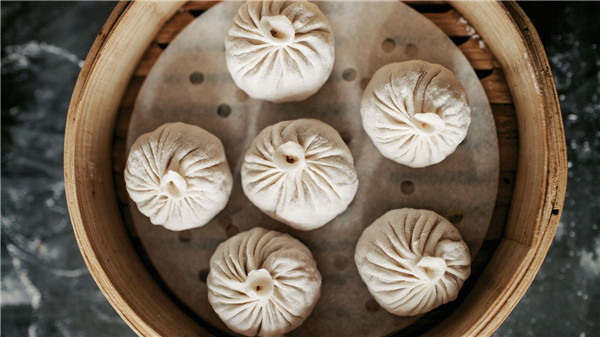A dumpling bible
 |
|
Soup dumplings can seem intimidating to make-and to eat-but are worth the effort. ED ANDERSON/CLARKSON POTTER PUBLISHERS |
If you have black vinegar and slivered ginger on the side, you're good to go.
Her tips for cooking these beauties is just as no-nonsense. For example: Instead of spending hours boiling pork skin, fat and feet to make the aspic needed for the soup, she suggests using powdered gelatin for a less fatty but still flavorful result.
Before turning the reader loose in the treasure-trove of recipes, however, she offers a primer on the basics. A page titled Know Your Dumplings walks you through the differences in making boiled (easiest), steamed (more delicate) and panfried dumplings ("more difficult to cook, but they produce an irresistible crunchy fried bottom"). Wrappers, cooking times and even fillings may be dictated by the cooking method chosen. For each, she has tips on how to keep the skins from bursting-the curse of novice dumpling makers.
You may not have known that you need an empty egg carton, but that's number two on her list of tools to have on hand. A flour-dusted egg carton allows you to tuck your raw dumplings into each slot and refrigerate them so they hold their shape. You'll also want to have a dumpling scraper to portion the dough, an Asian-style rolling pin (Western ones are too big to do the job efficiently), a bamboo steamer and steamer insulators-cabbage leaves or parchment paper-to keep your babies from sticking to the steamer. Finally, her careful explanation of the steps and pitfalls for making wrappers for boiled, steamed and pan-fried dumplings have the comfortable aura of a grandma at your shoulder. After reading, I have no doubt that my dumplings will be pretty as a picture. (I've almost forgotten my chuckles over her opening assertion: "They're also easy to make.")
You has a cool trick for presenting her pan-fried dumplings: She cooks them in an oiled pan with a starch slurry. The result is a paper-thin lacy pancake across the bottom of the pan, "connecting all the dumplings in a golden-brown disk of crackly crunch".
Tips:
? Buy good ingredients. No amount of soy sauce can make up for sad, wilted cabbage.
? Think juicy, not greasy. At home she uses 90 percent lean red meat for a lighter filling; while restaurants may use higher fat mixes (80/20 or even 70/30) for more oomph.
? Vegetables are the real stars in any dumpling, but to avoid too much moisture, wring out watery vegetables like cabbage in a tea towel before adding to fillings.
? Season lightly.
? Don't overcook.
? Don't dip right away; taste first. If dumplings are made well, they don't need as much sauce as you probably think.
Contact the writer at [email protected]






















